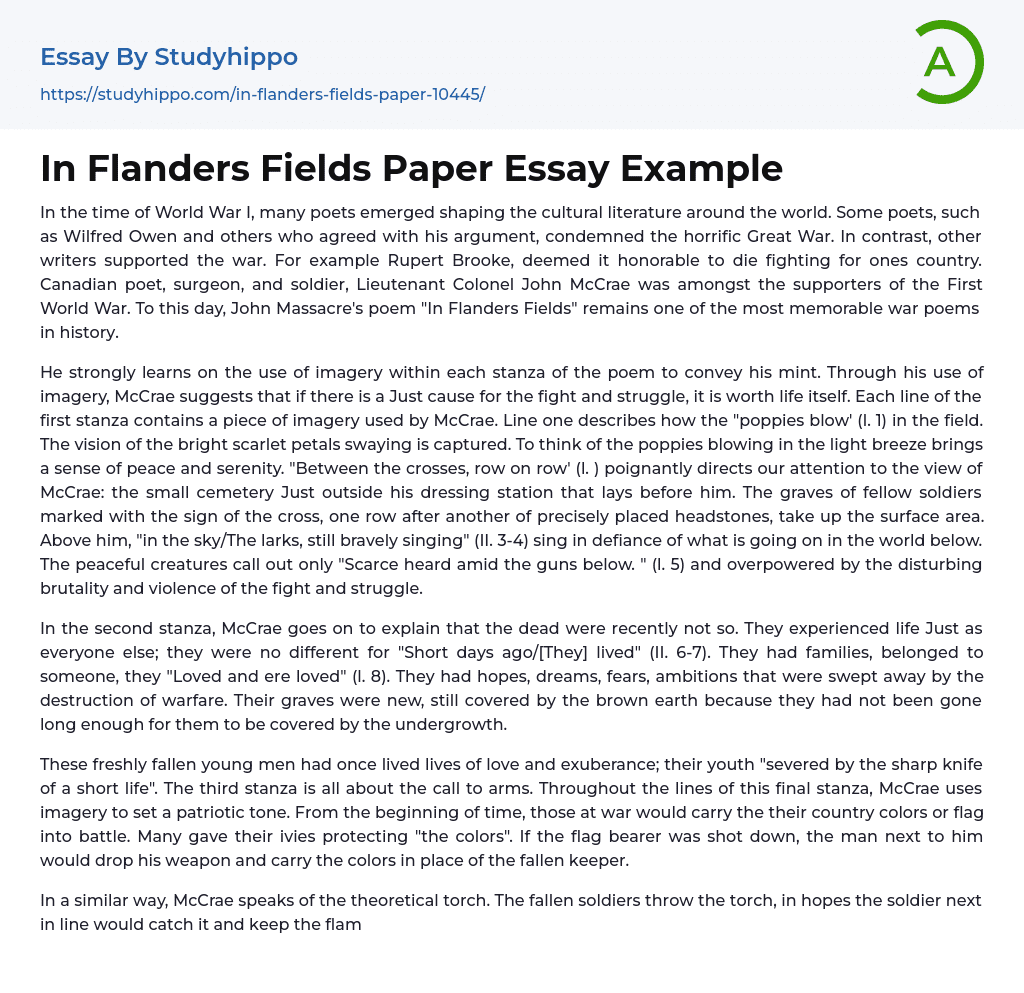In the time of World War I, many poets emerged shaping the cultural literature around the world. Some poets, such as Wilfred Owen and others who agreed with his argument, condemned the horrific Great War. In contrast, other writers supported the war. For example Rupert Brooke, deemed it honorable to die fighting for ones country. Canadian poet, surgeon, and soldier, Lieutenant Colonel John McCrae was amongst the supporters of the First World War. To this day, John Massacre's poem "In Flanders Fields" remains one of the most memorable war poems in history.
He strongly learns on the use of imagery within each stanza of the poem to convey his mint. Through his use of imagery, McCrae suggests that if there is a Just cause for the fight and struggle,
...it is worth life itself. Each line of the first stanza contains a piece of imagery used by McCrae. Line one describes how the "poppies blow' (l. 1) in the field. The vision of the bright scarlet petals swaying is captured. To think of the poppies blowing in the light breeze brings a sense of peace and serenity. "Between the crosses, row on row' (l. ) poignantly directs our attention to the view of McCrae: the small cemetery Just outside his dressing station that lays before him. The graves of fellow soldiers marked with the sign of the cross, one row after another of precisely placed headstones, take up the surface area. Above him, "in the sky/The larks, still bravely singing" (II. 3-4) sing in defiance of what is going on in the world below. The peaceful creatures call out only "Scarce heard amid the
guns below. " (l. 5) and overpowered by the disturbing brutality and violence of the fight and struggle.
In the second stanza, McCrae goes on to explain that the dead were recently not so. They experienced life Just as everyone else; they were no different for "Short days ago/[They] lived" (II. 6-7). They had families, belonged to someone, they "Loved and ere loved" (l. 8). They had hopes, dreams, fears, ambitions that were swept away by the destruction of warfare. Their graves were new, still covered by the brown earth because they had not been gone long enough for them to be covered by the undergrowth.
These freshly fallen young men had once lived lives of love and exuberance; their youth "severed by the sharp knife of a short life". The third stanza is all about the call to arms. Throughout the lines of this final stanza, McCrae uses imagery to set a patriotic tone. From the beginning of time, those at war would carry the their country colors or flag into battle. Many gave their ivies protecting "the colors". If the flag bearer was shot down, the man next to him would drop his weapon and carry the colors in place of the fallen keeper.
In a similar way, McCrae speaks of the theoretical torch. The fallen soldiers throw the torch, in hopes the soldier next in line would catch it and keep the flame from burning out. The flame resembles the light of freedom and the struggle against oppression. The deceased have passed on their duties to those still fighting to carry on the struggle. McCrae implores the living to keep the fire
of passion for the fight for freedom complete and Justice has won, the dead "shall not sleep" (l. 4) In the very last line of the poem, McCrae writes "though poppies grow/Len Flanders fields. " (II. 14-15).
Here, he alludes to the imagery of the first stanza, bringing back the serenity and peacefulness of the field and the beauty of the poppies. By using the word "though", McCrae warns against being fooled by the impression of tranquility. Although it may seem that way, it cannot be so until their cause is victorious. In the last stanza McCrae states there will NOT be serenity, it should NOT be peaceful. Instead, McCrae beseeches the soldiers to keep fighting, do not rest, and never give up. McCrae writes this poem from the vantage point of the fallen in order to further convey his point.
In writing from this point of view, he validates the worth of the cause and the price that may be paid. If the voices of the fallen urge you to continue, they believe it was worth it. Those who have paid the ultimate sacrifice believe the price was not too high. The pleading from the dead indicates that they think it is worth all life and that fighting for the right cause is far greater than the life of an individual. Losing is never an option and a fight to victory is worth the struggle till the very last person.
- Book Summary essays
- Metaphor essays
- Reader essays
- Rhyme essays
- Literary devices essays
- Villain essays
- Books essays
- Genre essays
- Literary Criticism essays
- Writer essays
- Protagonist essays
- Simile essays
- Poem essays
- Book Report essays
- Book Review essays
- Greek Mythology essays
- Plot essays
- Tragic Hero essays
- Coming of Age essays
- Play essays
- Rhetoric essays
- Rhetorical Question essays
- Translation essays
- Understanding essays
- Reason essays
- Character essays
- Letter essays
- American Literature essays
- Literature Review essays
- Utopia essays
- Poetry Analysis essays
- Dante's Inferno essays
- Between The World and Me essays
- Incidents in The Life of a Slave Girl essays
- Flowers for Algernon essays
- Myth essays
- Everyday Use essays
- Boo Radley essays
- Genesis essays
- Richard iii essays
- Alice in Wonderland essays
- On the road essays
- Ozymandias essays
- The Nightingale essays
- Holden Caulfield essays
- Animal Farm essays
- 1984 essays
- A Hanging essays
- Shooting An Elephant essays
- A Tale Of Two Cities essays




